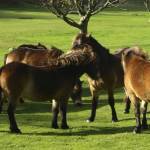Composting Horse Manure

Composting manure and soiled bedding is an environmentally sound way to deal with the waste products that result from keeping horses. The heat generated in a compost pile kills weed seeds and parasite eggs, two things that are not accomplished if fresh manure is spread onto fields. The finished product can often be sold to gardeners or nurseries, or it can be tilled into croplands or broadcast over pastures as a fertilizer.
Composting involves some initial investment, takes up space, and requires time and attention if the process is to work well. If you have more than one or two horses, it’s probably worthwhile to start out with the right setup rather than trying to manage your compost by hand.
A basic compost area can be built on a square concrete pad about 30 feet on a side. This allows enough space for three piles, each of which is enclosed in a three-sided concrete-block bin about 8 feet square and about 4 feet high. You will begin by putting manure and soiled bedding in the first bin and keeping it moist, but not soggy. As material is added and the pile grows deeper, it will need to be turned every few days. This is accomplished most easily with a bucket-equipped tractor.
Owners with several horses will need several bins to handle the compost most easily. If you want to sell or use “finished” compost, you don’t want to keep adding fresh manure to the same pile forever. Therefore, you will start dumping waste into the second pile after a while, letting the material in the first bin continue to decompose. You will eventually end up with a volume of material that is dark, crumbly, mostly odorless, and less than half what you started with. This compost can be removed from the first bin and used for whatever application you have planned.
Composting barn waste is not difficult but does require a certain amount of work. For more information on how to get started and to find out if there are particular requirements for composting in your area, contact the local agricultural extension agent for assistance.








